
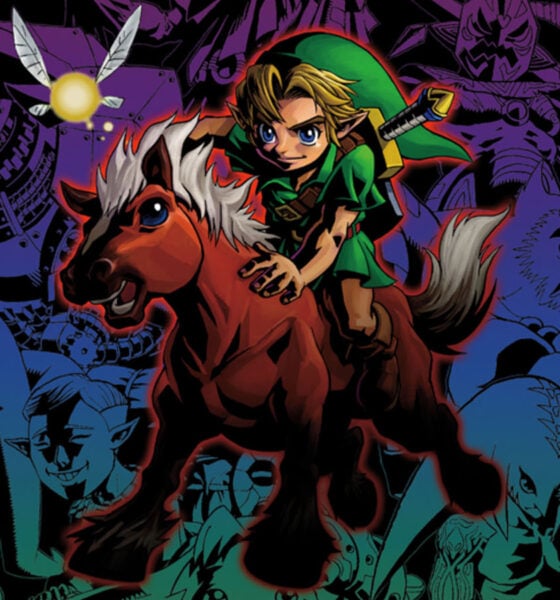
Features
The Legend of Zelda: Majora’s Mask and Life After Loss
The Legend of Zelda: Majora’s Mask is an intimate story about life after loss.
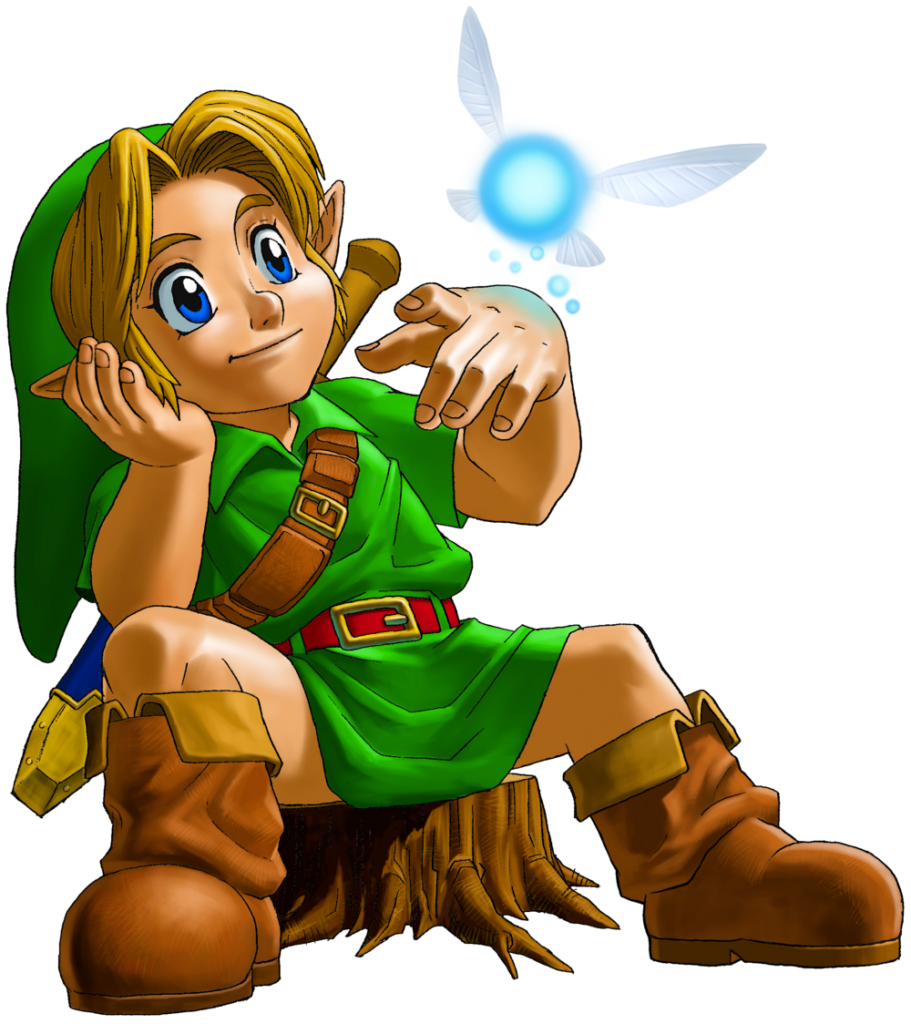
The Legend of Zelda: Majora’s Mask is a somber, intimate game. The average Zelda is classically epic in scope, telling tales of heroes and princesses saving kingdoms from true evil. Ocarina of Time manages to double as a surprisingly tragic coming-of-age narrative for Link, but the story is as grand as the series gets — going so far as to include Hyrule’s creation myth as one of the first cutscenes. Despite being a direct sequel, Majora’s Mask serves as a follow-up primarily for Link’s arc, not Ocarina’s main plot involving Zelda & Ganon. The story ultimately functions as an extension of Link’s coming-of-age journey, this time zoning in on a universal reality none of us can escape: life after loss. In Link’s case specifically, the loss of a dear friend.
Navi leaving Link at the end of Ocarina of Time represents his coming-of-age in a few different respects. She is the catalyst for his whole adventure, giving Link his call-to-action and staying by his side every step of the way. Navi is the only character who fully understands what Link is experiencing throughout the story. Absolutely no explanation is given to Navi’s departure, but the act signifies the Hero of Time’s maturity. Where Link once ran away from Saria, unable to actually say goodbye, he walks away from Navi composed and collected. Now a man in his own right, he doesn’t need a guardian fairy to watch over him anymore.

Although still silent and mostly stoic, MM uses visual language to express how much Link has grown. His model is taller than it was in Ocarina of Time, with longer proportions that allow him to comfortably wield a shield made for an adult. He does acrobatic flips while jumping from platform to platform, flaunting what are clearly honed skills. Link carries himself with enough confidence that trained soldiers recognize him as a man just by the sight of his sword, “It is dangerous outside the town walls, so I cannot allow a child like you to… A sword? My apologies, sir. It was wrong of me to treat you like a child.” Even the game’s concept art depicts him as a seasoned veteran with a determined look that speaks to his past heroics. But Majora’s Mask also posits a Link who, in spite of growing up, is struggling to move on.
“Done with the battles he once waged across time, he embarked on a journey. A secret and personal journey… a journey in search of a beloved and invaluable friend…”
The Hero of Time and Navi shared a unique bond. Ostracized by his community all his life for not having a fairy of his own, Navi finally welcomed him into the culture he was raised in with some semblance of normalcy. She watched him become a hero and grow into a man, valiantly fighting alongside him (Navi is the in-game Z-Target, after all). Thematically, Navi is so tied to Link’s childhood that she needs to leave in order to symbolize him entering adulthood at the end of Ocarina. Princess Zelda can’t give Link his youth back because he already grew up during the course of OoT. Navi leaving is indicative of just that, but just because you can move on from something doesn’t mean you can stop missing it.
The first image audiences see of Link in Majora’s Mask depicts him slumped over, head held down with a dour expression on his face bordering on depression. He cannot move on from losing Navi, so he aimlessly wanders the Lost Woods in search of her. There’s a suddenness to her departure to take into consideration, as well. Just like how we cannot choose when we grow up or how, Link does not choose for Navi to leave. She simply does. Life means living without proper closure or resolution sometimes. Some questions are bound to go unanswered no matter how desperately we may want those answers. Link will never know why Navi left, even if it doesn’t stop him from trying to find out.
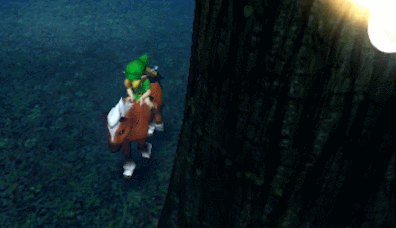
The Lost Woods lead Link to Termina, a land that loss lingers over like a falling moon. The Hero of Time is outright welcomed to the setting by experiencing loss on a mass scale. Link loses Epona, his trusty horse; the Ocarina of Time, a precious memento Princess Zelda gave him when they parted ways; and his own agency, trapped in a foreign land in a body that isn’t his. There’s almost a ritualistic quality to how much Link loses in his pursuit of Navi. He experiences an abrupt loss of self, stability, and life as he knows it. Life is indifferent to when it hands you losses.
Beyond Link, Majora’s Mask’s themes of loss are tied together through Termina’s many side stories. Characters do not shy away from expressing their sorrow, nor should they when their pain is often so great. Darmani is a proud Goron warrior who loses his honor when he dies failing to save his tribe from a fierce blizzard, “I may have died, but I cannot rest . . . I beg you! Bring me back to life with your magic! If it is beyond your power, then I beg of you to do this for me instead… Heal my sorrows. Any way that you can do it will suffice… Please… heal my sorrows.” Mikau is a Zora guitarist killed in an attempt to offer a grieving mother hope, “If I die like this… Even if I die… It won’t be in peace . . . Oh, somebody, somebody, please heal my soul.” Their loss is so immense that they are left in a tormented state between life and death.

“Soon, I’ll just be another wave in the ocean… destined to disappear.”
Losing someone you love brings pain unlike any other. The Deku Butler dedicates several lines of dialogue to his missing son — “Once again, thoughts of my son have me feeling sentimental” — in actuality, the weeping tree Link sees before Clock Town’s entrance: “Actually, when I see you, I am reminded of my son who left home long ago…” Anju and Kafei are star-crossed lovers who spend what may be their last three days alive apart, desperately trying to find a way to reclaim what they’ve lost. Kafei is too ashamed to let Anju see him without his ceremonial wedding mask, let alone transformed as a child. “I know Anju is worried… but I can’t go out yet.” While Anju fears the possibility that Kafei may have sincerely left her before their wedding. “And please, after you’ve seen him… Tell me how he looked. I’m scared… I… I can’t go.” Anju and Kafei’s insecurities prevent them from trusting each other to see past their own loss.
With loss ingrained in Termina’s community, most quests are framed around helping people come to terms with their burdens. Even at your lowest point, it is still possible to find comfort in what was through remembrance. Majora’s Mask conveys the importance of cherishing your memories through the power of music, a motif the story shares with Ocarina of Time. The Song of Time represents the brief time Link spent with Zelda, “This melody, lingering on the edges of your mind, is a song of memories of Princess Zelda.” Epona’s Song is described as a “song of two who are bound by trust,” signifying the bond Link shares with his beloved horse.

Saria’s Song has an interesting significance, playing when Tatl flashes back to the first time she met Skull Kid and again after the credits roll. Saria’s Song represents Link’s memories of Navi, along with the bond he eventually forges with Tatl. Its inclusion is no coincidence, especially when taking into consideration that Ocarina of Time features a side quest where you play the song to Skull Kid in exchange for a Piece of Heart. “You know Saria’s Song! We should be friends!” Saria’s Song is an ode to friendship, both new and lost alike.
An entire side quest is dedicated to expressing the influence music can have on those who have lost their way or are hurting. Visiting the Milk Bar on the night of the first or second day lets Link help Toto perform a soundcheck for the Ballad of the Wind Fish in each of his main playable forms. A local patron, Gorman, insults your playing every time except the last. Once he recognizes the full melody, he remembers that the Ballad of the Wind Fish was a song he loved in his youth. “Tha-that melody… That melody… It brings back so many memories!!” Simply hearing the song takes him back to a happier time and allows him to see past his current suffering. “I entered show business because I heard this song at the Carnival of Time long ago…” Remembrance offers Gorman perspective to reclaim the passion for the performance he once had.
The most powerful song in the game, the Song of Healing taps into the memories of the wounded in order to bring them peace of mind — a song about confronting your pain to regain your happiness. Darmani confronts the pain of his failure, his own perceived inability to be a hero in the eyes of his tribe. He is able to look past the fact he could not save the Gorons this time and remember the joy he felt amongst his people. Mikau confronts the fact he could not save Lulu’s eggs, finding peace in the love and life they shared, both as partners and bandmates. He is able to look past the tragedy of his failure and compose a fight song for his people in his last moments — a final will & testament to how he lived his life.
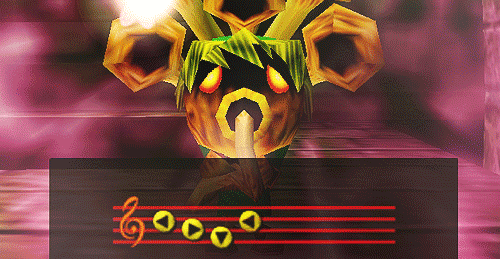
Link’s own transformation back into a Hylian is spurred by the Song of Healing, turning his Deku nightmare into an opportunity to reconcile a fundamental change within himself. The way he waves farewell to the once threatening Deku carries no resentment, showing that he has made peace with his trauma. Anju and Kafei are a unique case in that they don’t need the Song of Healing to repair what they lost, only each other. Their marriage is the hope that what was lost can be reclaimed. Likewise, the resolution of their storyline speaks to what will be, not what was. In more ways than one, Anju and Kafei represent that life will go on after loss, and you can be happy again. No matter what troubles hang over your head.
“We shall greet the morning… together.”
The fact no mention or reference to Navi is made during the ending can make it feel like Link’s journey is left unresolved, but Majora’s Mask shows the full scope of his arc through Skull Kid. While Kafei may be the closest thing Link has to a Terminan counterpart, Skull Kid is his narrative foil. Both characters are victims of the same type of loss. Where Link was left by Navi, Skull Kid was left by the Four Giants. If Anju’s grandmother is to be believed, “The imp was a friend of the giants since before they had created the four worlds. / ‘Why must you leave?’ / ‘Why do you not stay?’” Like Link’s relationship with Navi, Skull Kid shared a bond with the Giants only those involved could truly understand.

Skull Kid is what Link will become if he never moves past his need to find Navi. Both lost their friends and allowed that loss to take hold of them. For Link, that meant starting an aimless journey into the Lost Woods. For Skull Kid, it meant lashing out with pranks to the point of alienating everyone around him. “The childhood friend felt neglected, so he spread his anger across the four worlds. Repeatedly, he wronged all people.” Skull Kid’s plight is a cautionary tale. Unable to deal with losing those closest to him, he turns to hurting others for connection. Even after befriending Tatl and Tael, Skull Kid remains emotionally stunted until right before the credits roll. Link may not be causing mischief, but exiles himself from Hyrule. He’s on the same path to loneliness Skull Kid walked.
As foils, Link gets his closure for Navi through Skull Kid’s resolution with the Giants. While they can’t be together again, the Giants offer their friend the comfort that they never once stopped caring for him. Skull Kid may have lost his friends, but he always had their friendship. The Giants’ messages all become clear when the full scope of their relationship is revealed — “Help our friend.” — but they take on a different meaning when you consider that these are things Link needs to hear as well. In particular, the last Giant’s message is the most profound: “Forgive your friend.” Contextually, the Giants are telling Tatl to forgive Skull Kid for everything he’s done as he’s only reacting to the pain in his heart. Thematically, you can read Link’s whole journey as an inability to forgive Navi for leaving. He cannot accept that she is gone, so he goes after her even though she left on her own accord.
This notion of forgiveness is echoed by Igos du Ikana, king of a fallen kingdom, “Believing in your friends and embracing that belief by forgiving failure… These feelings have vanished from our hearts.” Navi failed to say goodbye properly, but just as Link has to forgive her so he can move on, he needs to believe that Navi leaving does not invalidate their friendship. To trust that she kept him in his heart the way he has her. That she did not leave with ill intent.
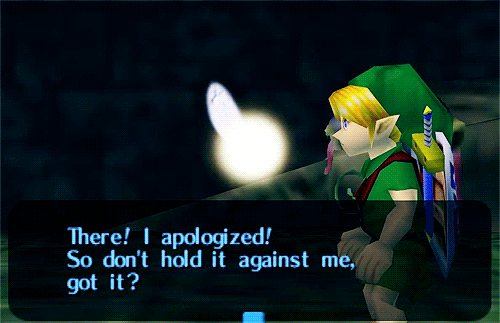
“I thought they didn’t want to be friends with me… but… They hadn’t forgotten about me.”
There’s a degree of reality to Link never finding Navi again that makes his arc all the more poignant. What makes loss life-changing is its permanence and how it fundamentally redefines us. To bring Navi and Link back together at the end of Majora’s Mask would be disingenuous and invalidate the story’s persistent message that irreversible loss can be overcome. He has to learn to live without Navi. Life doesn’t have to end with loss.
Majora’s Mask’s message is brought home by the Happy Mask Salesman; “Whenever there is a meeting, a parting is sure to follow. However, that parting need not last forever. Whether a parting be forever or merely for a short time… that is up to you.” Link may be saying goodbye to Termina, but he will always have the memories of his time there. Link and Navi may have parted ways, but she will always be in his heart. Life means suddenly saying goodbye to people you’re close to. Making peace with that fact is one of Majora’s Mask‘s core conceits. Life is a series of meetings and partings. We need to find the will to reconcile with those we lost and welcome others into our hearts.
Tatl reflects and parallels Link’s relationship with Navi in more ways than one. This is not the fairy he’s been looking for, but she’s the one he’s stuck with. Her animosity for Link gradually develops into admiration, considering him a genuine partner. “I’ve been thinking this ever since I joined you… You never want to give up. You always want to try. I admire you!” Where Navi left Link, Tatl sends him off. “So, why don’t you just leave and go about your business? The rest of us have a carnival to go to.” But not without letting him know how much of an impact his friendship made. “Link! …Thank you.” Both Ocarina of Time and Majora’s Mask end with a parting, but only the former feels like a loss. Through Termina, Link forges the confidence to live and lose.
It can be argued that Link loses more than he gains in Termina. His journey ends as it begins: with a boy aimlessly riding a horse through the Lost Woods. It’s a solemn note to end the story on, but this is a happy ending. Not all loss is bad, as Link loses the burden he was carrying through Majora’s Mask. It doesn’t matter where Navi went. What’s important is that there was a friendship at all. The final screen is a reflection of Link’s healed state of mind — a wood carving of himself beside two fairies, Skull Kid, and the four Giants scored to Saria’s Song. No Navi in sight, but Link still smiles.
In spite of being so much darker than Ocarina of Time, Majora’s Mask ends on a note of optimism where light pierces through the darkness and illuminates a way forward for Link. We may not know how his story truly ends or what happened to Navi, but the Hero of Time was able to find peace in the friendship he lost. Because to lose it meant he had something to lose. If only for a moment in time. Loss is inevitable, it’s how we deal with it that defines us. As the Hero of Time rides through the Lost Woods that christened his journey, he lifts his head high and gallops away finally ready to live his life.

-

 Features4 weeks ago
Features4 weeks agoGet Ready: A Top Isekai Anime from the 2020s Is Headed to Hulu!
-

 Features3 weeks ago
Features3 weeks agoSocial Gaming Venues and the Gamification of Leisure – A New Era of Play
-

 Features3 weeks ago
Features3 weeks agoSolo Leveling Snubbed?! You Won’t Believe Who Won First at the 2025 Crunchyroll Anime Awards!
-

 Culture3 weeks ago
Culture3 weeks agoThe Global Language of Football: Building Community Beyond Borders
-

 Technology4 weeks ago
Technology4 weeks agoIs Google Binning Its Google Play Games App?
-

 Technology4 weeks ago
Technology4 weeks agoHow to Download Documents from Scribd
-

 Guides4 weeks ago
Guides4 weeks agoBoosting and WoW Gold: Why Prestige and Efficiency Drive the Modern MMO Player
-

 Features2 weeks ago
Features2 weeks agoFarewell to a Beloved 13-Year-Old Isekai Anime That Brought Us Endless Laughter
-

 Technology2 weeks ago
Technology2 weeks agoGamification and Productivity: What Games Can Teach SaaS Tools
-

 Features1 week ago
Features1 week agoThis Upcoming Romance Anime Might Just Break the Internet; Trailer Just Dropped!
-

 Features3 weeks ago
Features3 weeks agoWait, What?! Tom & Jerry Just Turned Into an Anime and It’s Glorious!
-

 Culture2 weeks ago
Culture2 weeks agoIs the Gaming Industry Killing Gaming Parties?























Frankie G
March 18, 2022 at 2:59 pm
Man this hit hard, I love your analysis and I love Majoras Mask.
Anonymous
March 19, 2022 at 4:54 am
made me start thinking about this game so deeply. nice analysis
Sordatos
March 19, 2022 at 6:56 pm
Too bad the series didn’t continue on this and chose for easier crowd pleasers, imagine a BOTW with all that freedom BUT with poignant characters, story and actual theme that stays with you, instead of just a big playground where your actions don’t really matter
Jesus
March 21, 2022 at 8:05 pm
Hey man great essay